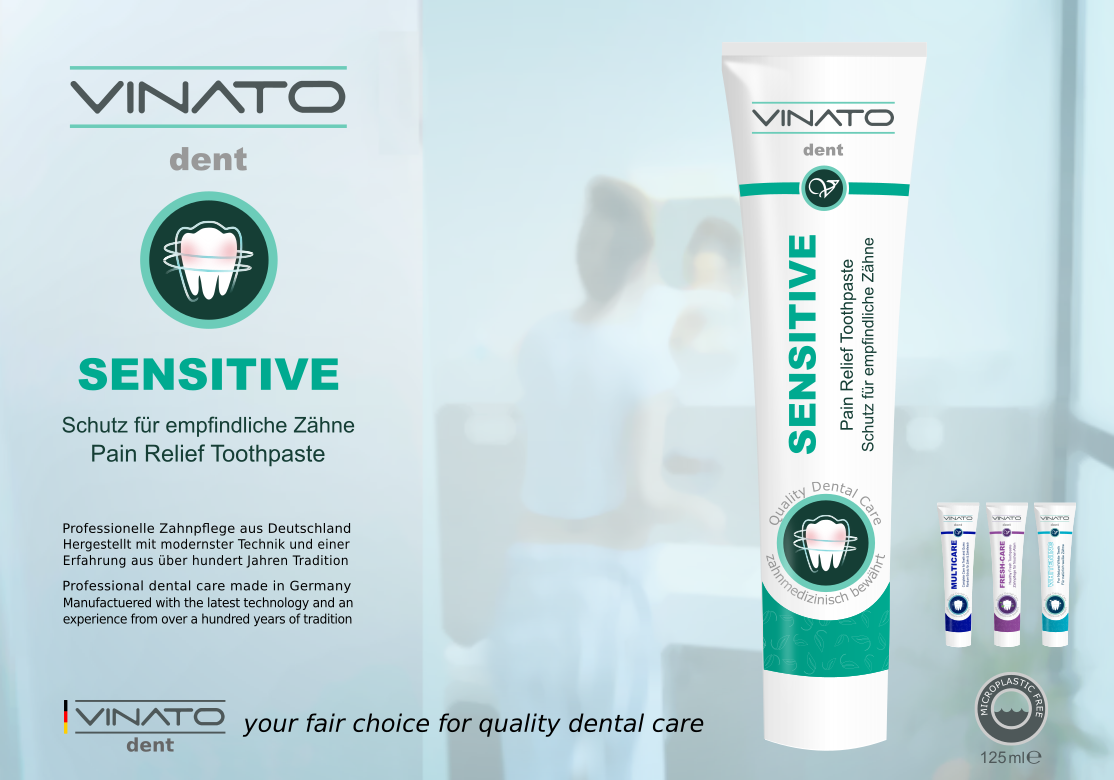
SENSITIVE


VINATO-dent Sensitive provides a comprehensive dental solution for those with sensitive teeth, with ingredients that work together to provide pain relief and maintain optimal dental health. Its formula includes among other things:
- A special potassium salt helps to reduce tooth sensitivity, making it easier for individuals to consume cold or hot food and drinks without experiencing discomfort.
- Sodium fluoride in an optimal dosage of 1450 ppm F‾ provides comprehensive caries prophylaxis.
- Zinc chloride and tetrapotassium pyrophosphate help gently but thoroughly prevent plaque buildup and tartar formation on the teeth, improving overall dental health.
- The combination of allantoin and zinc helps to care for the gums, ensuring they are kept in good condition.
- flavor and aroma combine to provide a refreshing, long-lasting sensation for a fresh breath.
If your teeth are sensitive, VINATO-dent SENSITIVE toothpaste can aid in minimizing pain and discomfort while also safeguarding your teeth. For optimal outcomes, it is recommended to use the sensitive toothpaste twice daily. Remember to rinse the toothpaste off thoroughly with water to eliminate all residues and ensure optimal oral hygiene.
Warning: for adults only!
Ingredients: Aqua, Sorbitol, Hydrated Silica, Potassium Citrate, Propylene Glycol, Glycerin, Sodium C14-16 Olefin Sulfonate, Xanthan Gum, Tetrapotassium Pyrophosphate, Aroma, Sodium Fluoride, Zinc Chloride, Sodium Saccharin, Allantoin, CI 77891. |

What are Sensitive Teeth?
Sensitive teeth are teeth that are painful or uncomfortable when exposed to certain stimuli, such as hot or cold temperatures, sweet or acidic foods and drinks, or air. The discomfort can range from mild to severe and can occur intermittently or persistently. Sensitive teeth can be caused by a number of factors, including:
Gum recession: When the gum tissue that covers the tooth root recedes, it exposes the underlying dentin layer, which contains tiny tubules that connect to the nerve endings of the tooth.
Tooth decay: Cavities can erode the enamel and dentin, exposing the nerve endings of the tooth.
Teeth grinding or clenching: This can cause the enamel to wear away, leading to sensitivity.
Cracked or chipped teeth: These can expose the inner layers of the tooth, leading to sensitivity.
Dental procedures: Teeth may become sensitive after dental procedures such as fillings, crowns, or bleaching.
Acidic foods and drinks: These can erode the enamel and expose the dentin.
Potassium Citrate
Potassium citrate is a special salt that is made up of potassium and citric acid, which helps to reduce tooth sensitivity. Numerous regulatory boards around the world consider potassium nitrate both safe and effective for the treatment of tooth sensitivity. It works by blocking the tiny tubules in the dentin (the layer beneath the enamel) that lead to the tooth’s nerve. By blocking these tubules, potassium citrate helps to reduce the sensation of pain and discomfort caused by tooth sensitivity.
Using toothpaste that contains fluoride and potassium nitrate can have a beneficial impact on reducing tooth sensitivity in a short period. Nevertheless, to achieve noticeable outcomes, it is essential to utilize the toothpaste two times daily for at least four weeks.
Sodium Fluoride
Fluoride is a mineral that can help prevent tooth decay and cavities. It works by strengthening tooth enamel and making it more resistant to the acids produced by bacteria in the mouth. Fluoride can also help repair early stages of tooth decay before it becomes a cavity.
The use of fluoride in dental products has been widely accepted and endorsed by major dental organizations worldwide, including the World Health Organization, the American Dental Association, and the European Federation of Periodontology. The European Union and Germany have regulations in place regarding the use of fluoride in dental products.
In the EU, fluoride may be used in toothpaste, mouthwash, and other dental products at concentrations up to 1,500 parts per million (ppm) for adults and up to 500 ppm for children under the age of six. The use of fluoride in drinking water is also regulated by the EU, with a maximum concentration of 1.5 milligrams per liter (mg/L).
In Germany, the use of fluoride in dental products is also regulated. The maximum concentration of fluoride allowed in toothpaste for adults is 1,500 ppm, and for children under the age of six, it is 500 ppm. The concentration of fluoride in drinking water is also regulated, with a maximum concentration of 1.5 mg/L.
Overall, the use of fluoride in dental products has been shown to be safe and effective in preventing tooth decay and cavities. However, it is important to follow the recommended guidelines and regulations regarding fluoride use to ensure its safety and effectiveness.
To know more about Fluoride, please see our detailed article in Vinato-dent Magazine
Zinc Chloride
Zinc chloride has antimicrobial properties that can help to reduce the amount of bacteria in the mouth, which in turn can also reduce bad breath. Zinc chloride can also help to strengthen tooth enamel. When added to toothpaste, it can form a protective layer on the teeth that can help to prevent erosion of the enamel. Zinc is generally considered a safe ingredient in toothpaste as long as it is used within the approved amount (no more than 1.0% according the German Federal Institute for Risk Assessment BfR).
Tetrapotassium Pyrophosphate
Tetrapotassium pyrophosphate is a chemical compound that is commonly used as a food additive and in oral care products, including toothpaste. It functions as a buffering agent, pH adjuster, and tartar control agent in toothpaste. Tetrapotassium pyrophosphate is effective in removing stains and preventing tartar buildup on teeth. It works by binding to calcium and magnesium ions in saliva, which helps prevent these ions from depositing on teeth and forming tartar.
In Germany, the use of Tetrapotassium Pyrophosphate (TKPP) in toothpaste is allowed as a food additive and is regulated by the European Union’s food safety authority, the European Food Safety Authority (EFSA). EFSA has established a maximum usage level of 6% TKPP in toothpaste. The German Federal Institute for Risk Assessment (BfR) also evaluates the safety of food additives and other substances used in consumer products, including toothpaste.
Allantoin
Allantoin is a useful ingredient in toothpaste for promoting gum health. It has been shown to have anti-inflammatory properties that can help reduce inflammation in the gums, which may be caused by factors such as gingivitis, periodontitis, or abrasive brushing. Additionally, allantoin has wound-healing properties that can promote the healing of minor wounds or sores in the gums caused by injury or irritation.
Allantoin’s moisturizing properties are also beneficial for the delicate tissues in the mouth, which can become dry or irritated from oral care products or other factors. Moreover, allantoin has some antimicrobial properties that can help reduce the amount of bacteria in the mouth and prevent the formation of plaque and tartar on teeth.
In Germany, allantoin is approved for use as a cosmetic ingredient, including in toothpaste. The European Union’s scientific committee on consumer safety (SCCS) has also reviewed the safety of allantoin and concluded that it is safe for use in cosmetic products. The SCCS has established a maximum concentration of 0.5% in rinse-off products, such as toothpaste.
Zinc
Zinc is a common ingredient found in toothpaste that provides several oral health benefits. Zinc is a mineral that has been shown to have antimicrobial properties, which can help reduce the amount of bacteria in the mouth and prevent the formation of plaque and tartar on teeth. It has also been shown to help reduce bad breath by neutralizing the odors caused by oral bacteria.
Zinc is often included in toothpaste formulations for its ability to strengthen teeth and prevent tooth decay. When combined with fluoride, zinc can enhance the remineralization of tooth enamel, which can help repair early stages of tooth decay and prevent further damage.
In Germany, zinc is an approved ingredient for use in toothpaste and other oral care products. The safety of zinc has been evaluated by the German Federal Institute for Risk Assessment (BfR), which has established a maximum limit for zinc in oral care products to prevent excessive ingestion. The European Union’s scientific committee on consumer safety (SCCS) has also reviewed the safety of zinc and established a maximum limit (up to 5% by weight) for zinc in oral care products.
